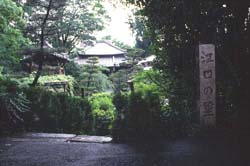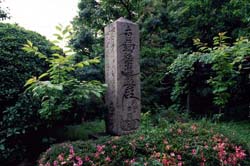|
|||
| 13, 3-chome, Minamieguchi, Higashiyodogawa-ku | |||
| [ Eguchinokimido-mae ] by bus about 300m to the east |
| According to legend of the temple, there
lived a courtesan around here named Eguchinokimi,
who had been a daughter of Tairanosuketomo
(the Heike clan) named Tae and had come over
to this district after the fall of the Heike
clan. When the priest Saigyo (1118-1190)
who were going to visit the Shitennoji temple
was caught in a shower around here on the
way in the 2nd year of Ninan (1167). Then,
he asked her to stay at her house but she
turned down his offer. They exchanged poems
of waka (31-syllabic Japanese poem) at that
time and he was so deeply impressed by her
gracefulness that they talked each other
through the night (the poems of them are
in the Shin-kokin wakashu (1205)). She became
a nun later and lived in a hermitage. The
hermitage is the origin of the temple. In
the Heian (794-1191) and the early days of
Kamakura (1192-1337) period this district
was an important place of transport by water
to Kyoto and it was crowded with many people.
So there were many women to entertain travelers.
Some of them were the daughters of the fallen
aristocracy. There are documents remained that some of the famous aristocracies made a visit around here in those days. The heritage was burned to ashes in the battle of Genko (1331-1334), Engen (1336-1340). The present temple was reconstructed in the year of Shotoku (1711-1716). |
|
 Jakkoji  the monument of waka |
| to the top page of The Yodogawa Eguchi Course |